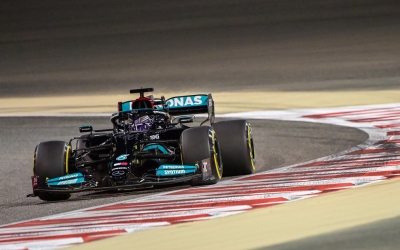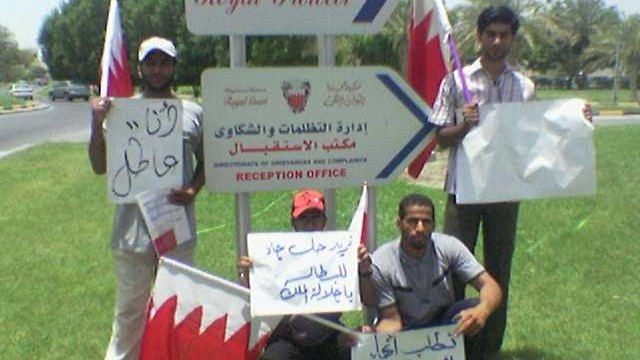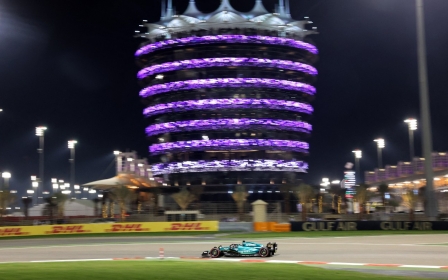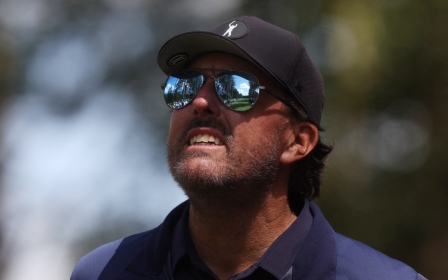Bahrain Grand Prix: Twenty years of dissent and sportswashing
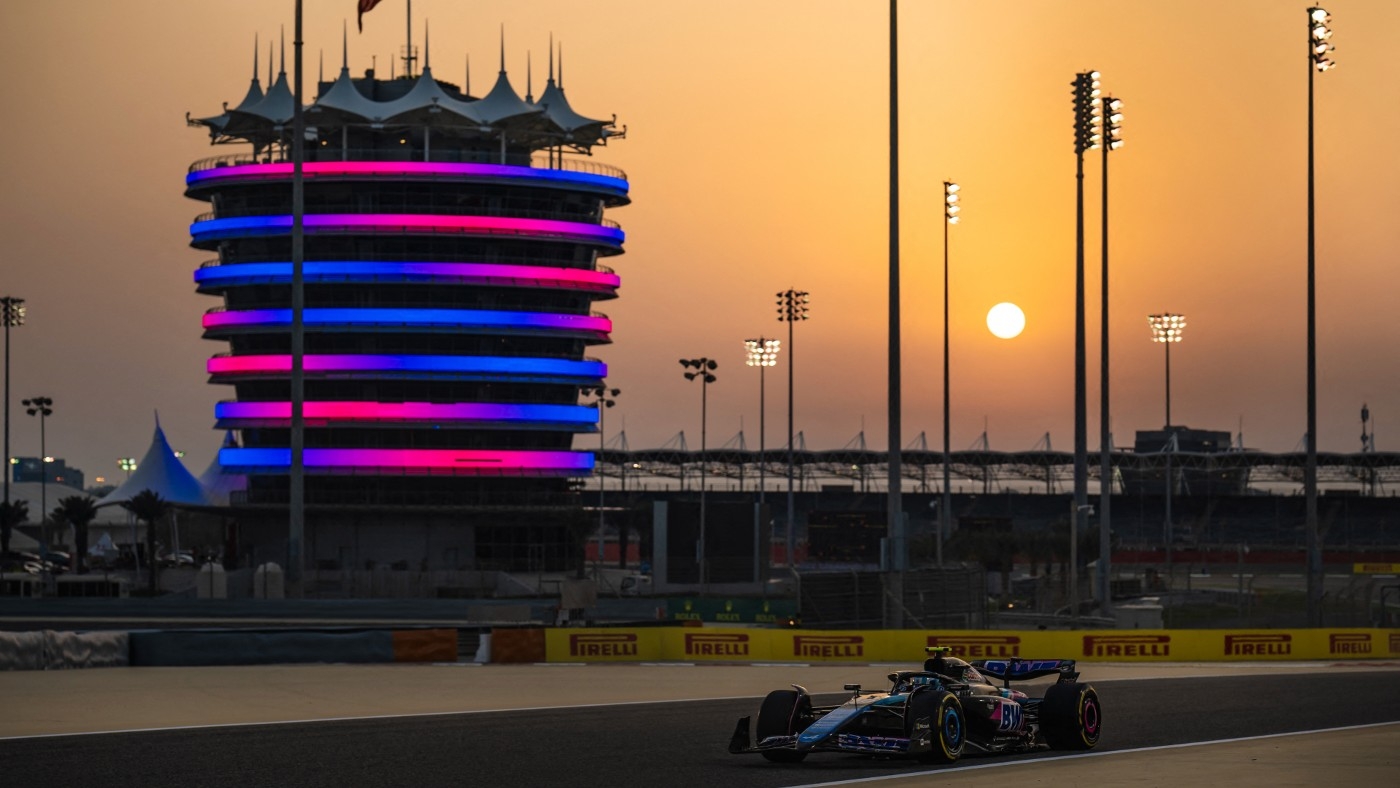
Moosa Satrawi was 22 when the Grand Prix came to his home.
At the time, he barely noticed. The arrival, in 2004, of the motorsport in the island kingdom of Bahrain, the smallest country in the Gulf, was being trumpeted by politicians and the ruling royal family.
But Satrawi, who holds a diploma in industrial rigging, had more pressing concerns. After three months, he had been made redundant from his job at the Bahrain Petroleum Company (Bapco) as migrant workers, mainly from India and Nepal, were shipped in to replace locals.
Satrawi and some other workers who had been laid off started protesting in front of the royal palace. They held signs that read: “We are Bahraini and we don’t have a job”; and: “We are Bahraini and we are looking for a job."
One day, the protesters saw a convoy of large vehicles heading in the direction of Sakhir, the site of the $150m circuit that was set to host the inaugural Grand Prix. Preparations were being made. The race was taking place that weekend.
Stay informed with MEE's newsletters
Sign up to get the latest alerts, insights and analysis, starting with Turkey Unpacked
“The police came and they hid us,” Satrawi told Middle East Eye. “They said that they wanted to talk to us about our situation, that the authorities wanted to help us, and that we could discuss what was happening.”
The protesters went with the police, out of sight of the palace and the main road leading to the track.
“It was just a way of moving us so that we wouldn’t be seen by journalists and people going to the Grand Prix,” Satrawi said.
At various points, Satrawi told MEE, key Bahraini leaders including General Khalifa al-Fadhala came to tell the protesters that they wanted to talk to them, and that they would work things out.
But the promise of a fair hearing never materialised. As well as protesting unemployment, Satrawi is part of Bahrain’s Shia majority, which has suffered waves of repression in a country ruled for over two centuries by the Sunni al-Khalifa family.
'They beat me and said that if we continued to protest they would go after my wife and family'
- Moosa Satrawi, Bahraini activist
One night in March 2005, at around midnight, five cars arrived at Satrawi’s house. Security forces took the young Bahraini, bundled him into one of the vehicles, and moved him to what he describes as a “hidden place”.
“They beat me and said that if we continued to protest they would go after my wife and family. They took my clothes off and sexually assaulted me,” he told MEE, preferring not to share further details of the assault.
Satrawi was left lying in the street, dependent on strangers to drive him home, where his distraught wife saw the blood on his clothes.
The next year, with another Bahrain Grand Prix on the horizon, Satrawi and his fellow protesters organised demonstrations to try and get some attention for their cause, which by now had broadened into a movement calling for dignity and an end to political repression in Bahrain.
Outside the Dana Mall, in the Seef district of Manama, Bahrain’s capital, journalists and other people involved in F1 had seen the protesters.
“The police used tear gas and rubber bullets on us, after we had been seen by F1 bosses,” Satrawi said. They besieged the mall and, Satrawi said, tied the protesters up. In the aftermath of the confrontation, he was sentenced to nine months in prison.
When he got out, in December 2006, Satrawi applied first for a British visa, which he did not get, and then for a Schengen visa, which he received.
Packing a bag containing pictures from protests and other evidence of his status as a political activist, he took his passport and headed to the airport where, despite being approached by security forces, he managed to escape, flying first to the Netherlands and then to London, where he was granted asylum and where he has lived ever since.
Troubling legacy
Saturday’s Bahrain Grand Prix marks the 20th anniversary of the inaugural race. For the country’s rulers, it is a time for “special celebrations to mark Bahrain’s landmark 20th anniversary in motorsport”.
For pro-democracy activists from Bahrain, including the Bahrain Institute for Rights and Democracy (Bird), the race is testament to a “troubling 20-year legacy of sportswashing in Bahrain”.
Sayed Alwadaei, Bird’s advocacy director, attended the first Bahrain Grand Prix, getting in with a free ticket the authorities handed out to all school and university students because they wanted to make sure there was a substantial crowd.
“The government made a big deal about it,” he told MEE. “I went but we didn’t understand what was going on. We could just hear lots of very noisy cars.”
Today, Alwadaei, who is one of the most prominent Bahraini activists in the world, says that “what hurts the most is when F1 makes truly astonishing false claims that it is a force for good".
“How can this be the case when your partners won’t tolerate any form of protest? Bahrain’s human rights record over the past 20 years has become significantly worse, with a major setback in 2011 when the mass protest movement was crushed and the race was cancelled,” he said, referencing the uprising that took hold in the kingdom at the time of the “Arab Spring”.
'This is what you wanted to do, to use the brand to promote the country, which is what they wanted to do obviously. It suited us and it suited them'
- Bernie Ecclestone, former F1 supremo
The Bahraini activists have been joined by a group of British politicians, including former Labour leader Jeremy Corbyn and former shadow chancellor John McDonnell, who wrote to F1’s leadership on 28 February.
“While F1 remains delusional about its impact, evidence illustrates that the human rights situation in Bahrain has significantly deteriorated over the past two decades,” the MPs and lords wrote.
They highlighted the case of Salah Abbas Habib, a 36-year-old anti-government protester who was found dead on the eve of the Bahrain Grand Prix in 2012. The motorsport has not investigated whether the death was linked to its presence in the island kingdom.
“For decades Formula 1 has worked hard be a positive force everywhere it races, including economic, social, and cultural benefits,” a spokesperson for F1 told MEE.
“Sports like Formula 1 are uniquely positioned to cross borders and cultures to bring countries and communities together to share the passion and excitement of incredible competition and achievement.
"We take our responsibilities on rights very seriously and set high ethical standards for counterparties and those in our supply chain, which are enshrined in contracts, and we pay close attention to their adherence.”
How the Grand Prix came to the Gulf
The issue of repression in Bahrain, though, was known to F1 from the start.
Speaking to MEE in 2021, Bernie Ecclestone, the man who ran the motorsport for four decades and who did the deal to bring it to the island kingdom, told the story of how the Grand Prix came to the Gulf.
In 1999, Salman bin Hamad Al Khalifa, Bahrain’s new, Cambridge-educated crown prince, got in touch with Ecclestone. Salman was, Ecclestone said, “completely behind the idea” of staging a race in Bahrain “because he realised that it would be the best thing that could happen for the country”.
As plans for the race progressed, Ecclestone met with opposition figures and local activists.
“When we first went there we had a bit of trouble with the local people, who were upset about what they thought the rulers were doing,” he said.
“In the end, I met all the protesters and really sat with them and talked to them. I said to them at the time, ‘what you’re looking for is a revolution, really’. That’s what normally happens. And then you attack the crown and capture the country. I said that’s the only thing you can ever do.”
Ecclestone wasn’t expecting Bahrain’s barricades to be stormed, though. “I mentioned that was what would normally happen when these things happen, knowing full well there was no way in the world it could happen because they would never be able to do that," he told MEE.
In 2004, the first Grand Prix took place, with Michael Schumacher winning for Ferrari.
Ecclestone, who was replaced as chief executive of the Formula One Group in 2017, years after he had stuck deals to bring the motorsport to Bahrain and the United Arab Emirates, was clear about what he thought Gulf rulers wanted to do with F1.
“This is what you wanted to do, to use the brand to promote the country, which is what they wanted to do obviously. It suited us and it suited them,” he told MEE.
“You have to pay the price for that. They realised it was cheap anyway for the amount of publicity they got. We all knew exactly what we were doing. And by luck, I think, it worked out all right.”
'Inhumane' treatment
At last year’s Bahrain Grand Prix, four protesters were arrested after demonstrating near the track. Former political prisoners Hajer Mansoor and Najah Yusuf were among those arrested.
Yusuf told Middle East Eye that they were then “treated inhumanely” by a senior police officer. She had previously served two years in prison "for protesting F1".
Two men were arrested alongside them, Ali Muhana and Muneer Mushaima, whose brother was executed in 2017.
At the time, the Bahraini government issued a statement, which was passed on to MEE by an F1 spokesperson, saying that no-one had been arrested.
In the last week, Mansoor and Mushaima’s family have had their houses raided by the police in Bahrain. Muhana received a police summons, but when he turned up at the station, he was told it had been an accident.
Yusuf, having had no contact with the authorities since the 2023 Grand Prix, received a text message asking her to go to the police station. She did not go.
“If you ask me why this has happened to them all in the last week, I would say the message is clear: they want to make sure nothing happens around the Grand Prix,” Alwadaei said.
Moosa Satrawi is now 42-years old. He has been in London for almost two decades, but continues to campaign for his people, the people of Bahrain.
Three of his brothers are in prison back home. He has not returned to the island kingdom since he left. He is scared, sometimes, that he will be sent back there.
“The Grand Prix helps them,” he said, of the political repression exercised by authorities in Bahrain. “It helps them do this."
Middle East Eye delivers independent and unrivalled coverage and analysis of the Middle East, North Africa and beyond. To learn more about republishing this content and the associated fees, please fill out this form. More about MEE can be found here.


